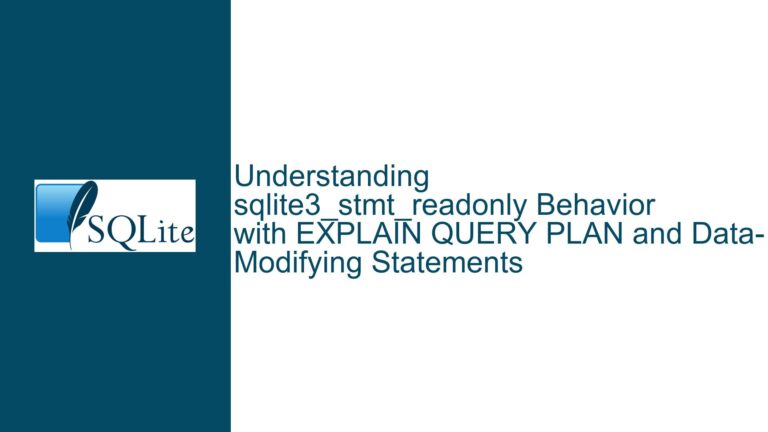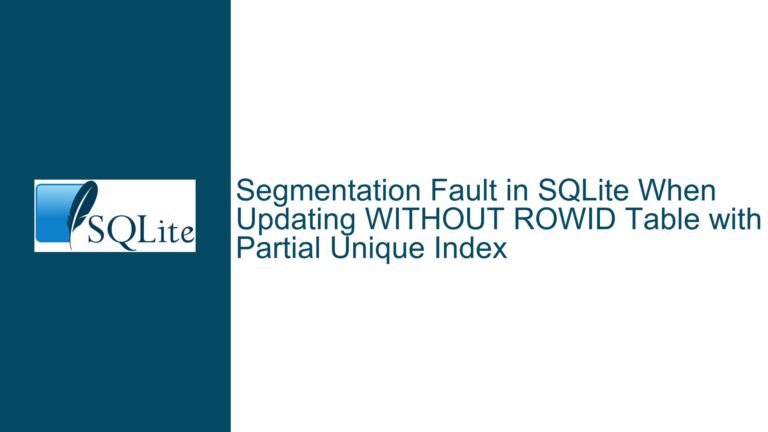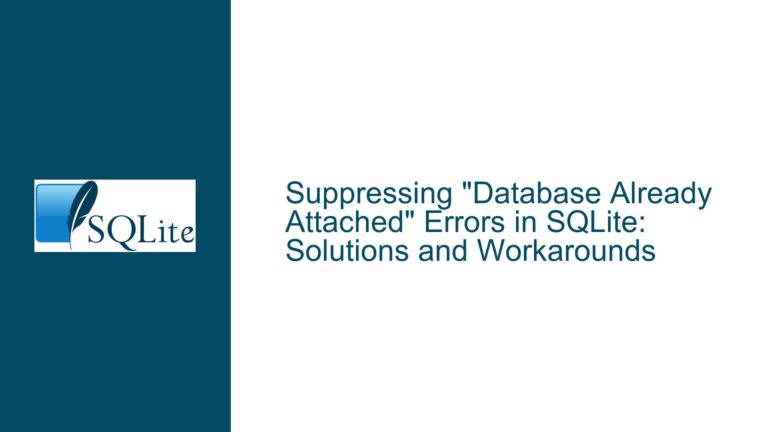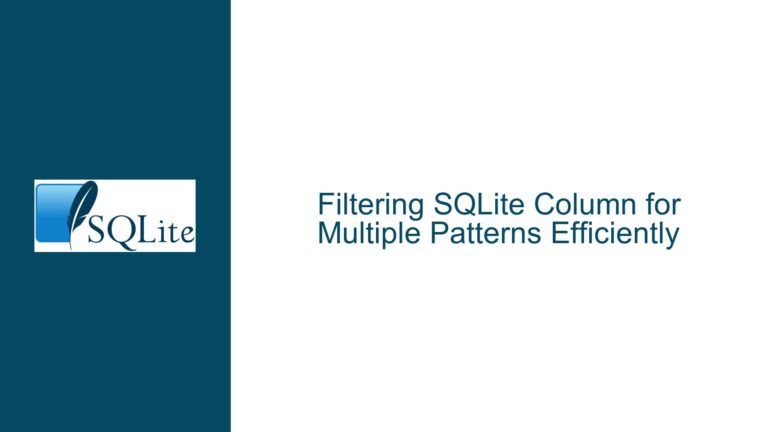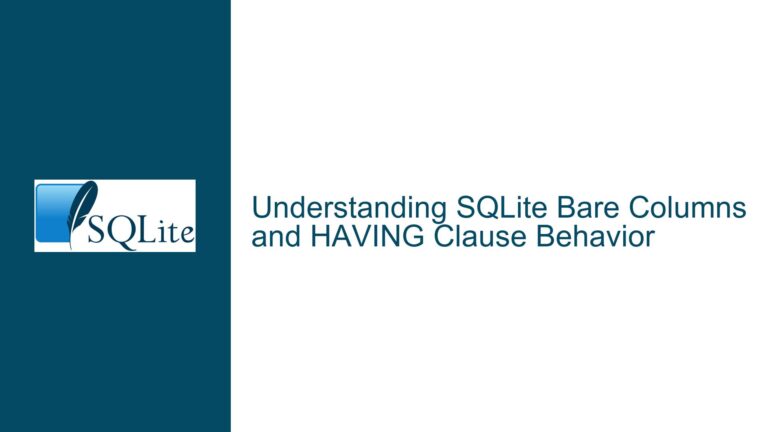Resolving Schema-Specific Queries with SQLite’s pragma_table_info Function
Misinterpretation of Schema Context in pragma_table_info
When working with SQLite, one common task is to retrieve metadata about tables, such as column names, types, and constraints. SQLite provides a convenient table-valued function called pragma_table_info that allows developers to query this metadata. However, a frequent point of confusion arises when dealing with multiple schemas, particularly when tables with the same name exist in different attached databases. The issue stems from the misunderstanding of how pragma_table_info interprets schema context.
In the provided scenario, the user attempted to query the metadata of two tables named x in two different schemas (db1 and db2). The expectation was that pragma_table_info would return different results for each schema, reflecting the distinct column definitions (c1 in db1.x and c2 in db2.x). However, the initial approach of prefixing the schema name directly to pragma_table_info did not yield the expected results. Instead, the function returned the same metadata for both schemas, leading to confusion and the assumption that the function was not schema-aware.
Schema Specification in pragma_table_info Function Calls
The root cause of this issue lies in the way SQLite’s built-in table-valued functions, including pragma_table_info, handle schema context. Unlike regular table queries, where the schema can be explicitly specified using the schema.table syntax, table-valued functions like pragma_table_info do not inherently belong to any specific schema. This means that prefixing the function with a schema name (e.g., db2.pragma_table_info) does not influence the schema context in which the function operates.
Instead, the schema context must be explicitly passed as a second argument to the pragma_table_info function. This design allows the function to be flexible and applicable across multiple schemas without being tied to a specific one. The correct syntax for querying table metadata in a specific schema is:
SELECT * FROM pragma_table_info('table_name', 'schema_name');
In the example provided, the correct query to retrieve metadata for the x table in the db2 schema would be:
SELECT * FROM pragma_table_info('x', 'db2');
This explicit schema specification ensures that pragma_table_info operates within the correct context, returning the expected metadata for the specified table in the specified schema.
Correct Usage and Best Practices for Schema-Specific Metadata Queries
To avoid confusion and ensure accurate results when querying metadata across multiple schemas, it is essential to follow best practices for using pragma_table_info and similar table-valued functions in SQLite. Here are some detailed steps and considerations:
Understanding the Function Signature
The pragma_table_info function has the following signature:
pragma_table_info(table_name, schema_name)
table_name: The name of the table for which metadata is to be retrieved.schema_name: The name of the schema (attached database) containing the table. This parameter is optional; if omitted, the function defaults to the main schema.
Explicit Schema Specification
Always specify the schema name as the second argument when querying metadata for tables in attached databases. This ensures that the function operates within the correct schema context and returns accurate results.
-- Correct usage with explicit schema specification
SELECT * FROM pragma_table_info('x', 'db2');
Avoiding Schema Prefix Misuse
Do not prefix the pragma_table_info function with a schema name, as this does not influence the schema context. The following syntax is incorrect and will not yield the desired results:
-- Incorrect usage with schema prefix
SELECT * FROM db2.pragma_table_info('x');
Handling Multiple Schemas
When working with multiple schemas, it is crucial to maintain clarity and consistency in schema references. Use descriptive schema names and ensure that all queries explicitly specify the schema context where necessary.
Example Workflow
Consider a scenario where you have two attached databases, db1 and db2, each containing a table named x with different column definitions. The following workflow demonstrates the correct approach to querying metadata for these tables:
- Attach the databases:
ATTACH DATABASE ':memory:' AS db1;
ATTACH DATABASE ':memory:' AS db2;
- Create tables with different column definitions in each schema:
CREATE TABLE db1.x (c1 text);
CREATE TABLE db2.x (c2 text);
- Query metadata for each table using explicit schema specification:
-- Query metadata for db1.x
SELECT * FROM pragma_table_info('x', 'db1');
-- Query metadata for db2.x
SELECT * FROM pragma_table_info('x', 'db2');
Debugging and Validation
If the results are not as expected, verify the following:
- Ensure that the schema names and table names are correctly spelled and match the actual database objects.
- Confirm that the tables exist in the specified schemas by querying the
sqlite_mastertable:
SELECT * FROM db1.sqlite_master WHERE type = 'table' AND name = 'x';
SELECT * FROM db2.sqlite_master WHERE type = 'table' AND name = 'x';
- Double-check the function syntax and ensure that the schema name is passed as the second argument.
Advanced Usage: Combining Metadata from Multiple Schemas
In more complex scenarios, you may need to combine metadata from tables across multiple schemas. This can be achieved using SQLite’s powerful querying capabilities, such as joins and unions. For example, to retrieve a unified view of column metadata from all schemas, you could use a query like this:
SELECT 'db1' AS schema_name, * FROM pragma_table_info('x', 'db1')
UNION ALL
SELECT 'db2' AS schema_name, * FROM pragma_table_info('x', 'db2');
This query returns a combined result set with an additional column indicating the schema name, making it easier to distinguish between metadata from different schemas.
Performance Considerations
While pragma_table_info is a convenient and efficient way to retrieve table metadata, it is essential to be mindful of performance implications, especially when working with large databases or multiple schemas. Each call to pragma_table_info incurs a small overhead, so minimizing unnecessary calls and optimizing queries can help maintain performance.
Conclusion
Understanding the nuances of schema context in SQLite’s pragma_table_info function is crucial for accurate metadata retrieval. By explicitly specifying the schema name as the second argument and avoiding common pitfalls such as schema prefix misuse, developers can ensure that their queries return the expected results. Following best practices and leveraging SQLite’s querying capabilities can further enhance the efficiency and clarity of metadata operations in multi-schema environments.

